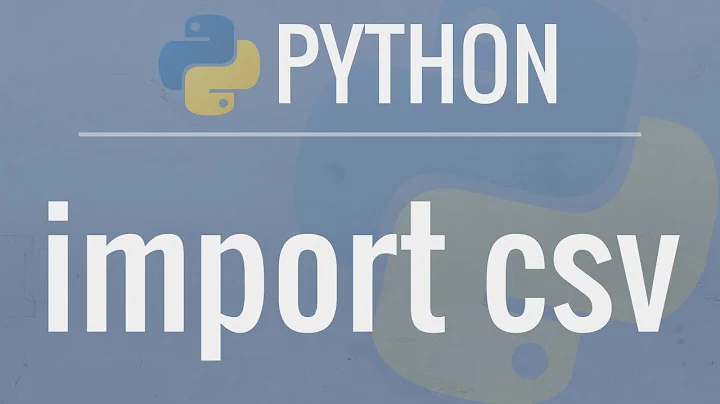Can a CSV file have a comment?
Solution 1
The CSV "standard" (such as it is) does not dictate how comments should be handled, no, it's up to the application to establish a convention and stick with it.
Solution 2
In engineering data, it is common to see the # symbol in the first column used to signal a comment.
I use the ostermiller CSV parsing library for Java to read and process such files. That library allows you to set the comment character. After the parse operation you get an array just containing the real data, no comments.
Solution 3
No, CSV doesn't specify any way of tagging comments - they will just be loaded by programs like Excel as additional cells containing text.
The closest you can manage (with CSV being imported into a specific application such as Excel) is to define a special way of tagging comments that Excel will ignore. For Excel, you can "hide" the comment (to a limited degree) by embedding it into a formula. For example, try importing the following csv file into Excel:
=N("This is a comment and will appear as a simple zero value in excel")
John, Doe, 24
You still end up with a cell in the spreadsheet that displays the number 0, but the comment is hidden.
Alternatively, you can hide the text by simply padding it out with spaces so that it isn't displayed in the visible part of cell:
This is a sort-of hidden comment!,
John, Doe, 24
Note that you need to follow the comment text with a comma so that Excel fills the following cell and thus hides any part of the text that doesn't fit in the cell.
Nasty hacks, which will only work with Excel, but they may suffice to make your output look a little bit tidier after importing.
Solution 4
I think the best way to add comments to a CSV file would be to add a "Comments" field or record right into the data.
Most CSV-parsing applications that I've used implement both field-mapping and record-choosing. So, to comment on the properties of a field, add a record just for field descriptions. To comment on a record, add a field at the end of it (well, all records, really) just for comments.
These are the only two reasons I can think of to comment a CSV file. But the only problem I can foresee would be programs that refuse to accept the file at all if any single record doesn't pass some validation rules. In that case, you'd have trouble writing a string-type field description record for any numeric fields.
I am by no means an expert, though, so feel free to point out any mistakes in my theory.
Solution 5
A Comma Separated File is really just a text file where the lines consist of values separated by commas.
There is no standard which defines the contents of a CSV file, so there is no defined way of indicating a comment. It depends on the program which will be importing the CSV file.
Of course, this is usually Excel. You should ask yourself how does Excel define a comment? In other words, what would make Excel ignore a line (or part of a line) in the CSV file? I'm not aware of anything which would do this.
Related videos on Youtube
Pure.Krome
Just another djork trying to ply his art in this mad mad world. Tech stack I prefer to use: Laguage: C# / .NET Core / ASP.NET Core Editors: Visual Studio / VS Code Persistence: RavenDB, SqlServer (MSSql or Postgres) Source control: Github Containers: Docker & trying to learn K&'s Cloud Platform: Azure Caching/CDN: Cloudflare Finally: A Tauntaun sleeping bag is what i've always wanted spaces > tabs
Updated on August 21, 2021Comments
-
 Pure.Krome almost 2 years
Pure.Krome almost 2 yearsIs there any official way to allow a CSV formatted file to allow comments, either on its own line OR at the end of a line?
I tried checking wikipedia on this and also RFC 4180 but both do not mention anything which leads me to believe that it's not part of the file format so it's bad luck to me and I should then use a seperate ReadMe.txt file thingy to explain the file.
Lastly, i know it's easy for me to add my own comments in, but i was hoping that something like Excel could just import it straight away with no need for a consumer to have to customize the import process.
So, thoughts?
-
 Square Rig Master over 13 yearsWhat would you comment on? The values in each line or the file itself? Is XML file an alternative for you?
Square Rig Master over 13 yearsWhat would you comment on? The values in each line or the file itself? Is XML file an alternative for you? -
 new123456 almost 12 yearsThe preposal was shot down for Python.
new123456 almost 12 yearsThe preposal was shot down for Python. -
 hunt over 9 yearsMaybe a version string for the data @SquareRigMaster . Just like I am trying to do now?
hunt over 9 yearsMaybe a version string for the data @SquareRigMaster . Just like I am trying to do now? -
 Richard Smith about 3 years@SquareRigMaster – Or a copyright statement.
Richard Smith about 3 years@SquareRigMaster – Or a copyright statement.
-
-
 vipw almost 12 yearsRFC 4180 is the standard now.
vipw almost 12 yearsRFC 4180 is the standard now. -
 Tyler Mumford almost 11 yearsAaand, I just read that you didn't want to customize the import process. Sorry 'bout that. Hopefully somebody finds this useful, then.
Tyler Mumford almost 11 yearsAaand, I just read that you didn't want to customize the import process. Sorry 'bout that. Hopefully somebody finds this useful, then. -
 Qix - MONICA WAS MISTREATED over 8 years
Qix - MONICA WAS MISTREATED over 8 yearsThere is no standard which defines the contents of a CSV fileFalse. -
 Paul Weibert over 8 yearsRFC 4180 is not a standard, rfc4180 tells: "This memo provides information for the Internet community. It does not specify an Internet standard of any kind. Distribution of this memo is unlimited."
Paul Weibert over 8 yearsRFC 4180 is not a standard, rfc4180 tells: "This memo provides information for the Internet community. It does not specify an Internet standard of any kind. Distribution of this memo is unlimited." -
 Alien Technology over 8 years@Qix - from section 2 of the referenced document: "While there are various specifications and implementations for the CSV format (for ex. [4], [5], [6] and [7]), there is no formal specification in existence"
Alien Technology over 8 years@Qix - from section 2 of the referenced document: "While there are various specifications and implementations for the CSV format (for ex. [4], [5], [6] and [7]), there is no formal specification in existence" -
 Marco Sulla about 8 yearsOK, can we say is a de facto standard?
Marco Sulla about 8 yearsOK, can we say is a de facto standard? -
 usr-local-ΕΨΗΕΛΩΝ almost 8 yearsAll RFCs are memos not intended to provide any Internet standard AFAIK
usr-local-ΕΨΗΕΛΩΝ almost 8 yearsAll RFCs are memos not intended to provide any Internet standard AFAIK -
 Steve Hole almost 8 yearsYah ... that's not true. There are standards track documents and non-standard track (informational) documents. The entire process, including descriptions, processes and rules for IETF issued documents is defined by RFC2026 with some follow on amendments. Every RFC will specify at the beginning which track it is on.
Steve Hole almost 8 yearsYah ... that's not true. There are standards track documents and non-standard track (informational) documents. The entire process, including descriptions, processes and rules for IETF issued documents is defined by RFC2026 with some follow on amendments. Every RFC will specify at the beginning which track it is on. -
 maurice over 7 yearsSince there will probably be a block of code whose main purpose is to load this csv, maybe that's the best place to put comments relating to the csv data. Or in the commit messages when checking csv changes into source control.
maurice over 7 yearsSince there will probably be a block of code whose main purpose is to load this csv, maybe that's the best place to put comments relating to the csv data. Or in the commit messages when checking csv changes into source control. -
 IAmNaN over 5 yearsRFC is an acronym that stands for "Request For Comments," meaning it is intended on gathering feedback from the community. That being said, almost the entire internet runs on unratified RFCs, or less. The CSV "standard" itself is essentially undefined without RFC4180. It is the most definitive model we have although it might change someday. As it stands, RFC4180 has no provisions for inserting comments. If you add your own commenting mechanism to the format, don't expect interoperability with other reader/writers that follow RFC4180.
IAmNaN over 5 yearsRFC is an acronym that stands for "Request For Comments," meaning it is intended on gathering feedback from the community. That being said, almost the entire internet runs on unratified RFCs, or less. The CSV "standard" itself is essentially undefined without RFC4180. It is the most definitive model we have although it might change someday. As it stands, RFC4180 has no provisions for inserting comments. If you add your own commenting mechanism to the format, don't expect interoperability with other reader/writers that follow RFC4180. -
 Ben Hershey almost 4 yearsGood post. Another reason I can think of for why you might want comments is to add some meta-data about the file as a whole. Adding a whole column or row just for one cell with this info this feels a bit awkward.
Ben Hershey almost 4 yearsGood post. Another reason I can think of for why you might want comments is to add some meta-data about the file as a whole. Adding a whole column or row just for one cell with this info this feels a bit awkward. -
 Crog over 2 yearsSome parsers (Matlab included) support detecting lines starting in a prefix character and handling this differently as comments etc. For example adding some form of 'meta' versioning for optimising/guiding the code interpreting the data can be achieved via comment and '#' is what I have more often seen and used: #Csv/Version 1.9 Time,ValueA,ValueB 0.0, 123, 456 0.1, 123, 349
Crog over 2 yearsSome parsers (Matlab included) support detecting lines starting in a prefix character and handling this differently as comments etc. For example adding some form of 'meta' versioning for optimising/guiding the code interpreting the data can be achieved via comment and '#' is what I have more often seen and used: #Csv/Version 1.9 Time,ValueA,ValueB 0.0, 123, 456 0.1, 123, 349 -
 dat over 2 yearsWith emacs,
dat over 2 yearsWith emacs,csv-comment-startdefaults to# -
 Chiarcos almost 2 yearsThe use of
Chiarcos almost 2 yearsThe use of#is also a de facto standard in TSV formats ("CoNLL formats") in language technology. These formats pre-date the current CSV spec by more than a decade. Main difference to CSV is that they require the separator to be TAB (or, earlier, SPACE) rather than comma, but technically, that's still regarded a CSV format. -
 Greg Wittmeyer about 1 yearMicrosoft IIS log files use the # for comments.
Greg Wittmeyer about 1 yearMicrosoft IIS log files use the # for comments.







